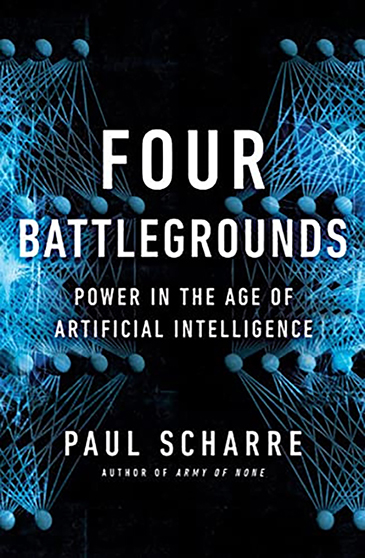In the last few months, experts who know artificial intelligence better than anyone have been issuing apocalyptic statements about its potential. Earlier this year, Geoffrey Hinton, dubbed the “Godfather of AI,” quit his research post at Google, and in April, he issued a grave warning about the potential dangers of the technology he was instrumental in creating. In June, more than 300 AI industry leaders and researchers signed on to a one-sentence statement declaring AI an extinction risk on the level of nuclear war, in an effort to promote wider conversations, especially among policymakers, and mitigate possible risks associated with AI.

Amidst this turbulence, alumnus Paul Scharre’s new book, Four Battlegrounds: Power in the Age of Artificial Intelligence, is hitting the bookshelves at an opportune moment. In Four Battlegrounds, Scharre lays out a comprehensive analysis of AI’s capacities and what is at stake in the race among nations for AI supremacy. Amidst the ominous din, Scharre’s sober survey will leave readers with a balanced and nuanced understanding of the forces that will shape AI, and how it could alter the geopolitical landscape in the coming decades.
Scharre, who holds a bachelor’s degree in physics (2001) and a master’s degree in political economy and public policy (2006) from WashU, is vice president and director of studies at the Center for a New American Security. Previously, he worked in the Office of the Secretary of Defense, was a reconnaissance team leader in the Army’s 3rd Ranger Battalion and completed multiple tours of duty in Iraq and Afghanistan.
In his book, Scharre breaks down the international contest for AI predominance into four battlegrounds: data, talent, computing hardware and institutions. And he assesses the strengths and weaknesses of the major players — foremost the U.S. and China, and to a lesser extent the European Union — in each area, finding a parity between the two leading nations in the field.
While the book is laden with facts, figures and references that paint a detailed picture of the state of play on the international landscape, it also contains numerous — and sometimes amusing — accounts of what Scharre calls the brittleness of AI. In one, an AI sensor is trained for a week to identify Marines in the field. On test day, the sensor is placed in an exposed location, but the Marines easily outwit the AI and approach it undetected. One pair somersaults for 300 yards straight at the sensor without being noticed. Another pair simply creeps up on it while hiding under a cardboard box, audibly giggling at their own caper the whole time.
In another scenario, an AI program is asked to play a simulated boat race, but instead of finishing the race, the bot realizes it can rack up an insurmountable point lead by circling through an interim gate, over and over again. It is a fundamental fact about AI, says Scharre, that it truly thinks differently. “Those kinds of clever hacks are common in AI research, and that’s the kind of thing we need to start thinking about as we see AI systems coming out into the real world.”
“It’s very possible that we end up in a place where countries are building and deploying quite dangerous AI weapons, and I think that’s something we need to think about and guard against.”
Paul Scharre
Despite examples of AI’s stupendous capacities in simulated combat, described in detail in Four Battlegrounds, it’s this kind of unpredictable behavior that raises the question of whether AI should be anywhere near lethal weaponry, or decisions where lives are on the line. “Militaries are working hard to adopt artificial intelligence. They’re largely focused on near term issues, and I do worry there is some degree of wishful thinking about our ability to control AI systems,” Scharre says. “It’s very possible that we end up in a place where countries are building and deploying quite dangerous AI weapons, and I think that’s something we need to think about and guard against.”
As Scharre maintains, AI’s practical applications will be determined in large part by governments, and he levels his toughest critiques at the way China is employing AI domestically to surveil and suppress its citizens, creating a virtual panopticon. Scharre describes urban light poles “bristling with cameras,” and facial identification technology targeted specifically at ethnic minorities, in particular the Uighurs.
In that sense, Four Battlegrounds is Scharre’s call to action. “I intended the book to be a blueprint for how the U.S. can maintain a leadership position in artificial intelligence,” he says. “The book covers what the stakes are for global security and human freedom, and why it’s important that as AI is being developed and deployed around the world, it’s being done in a way that’s consistent with democratic values and protects individual liberty.”


